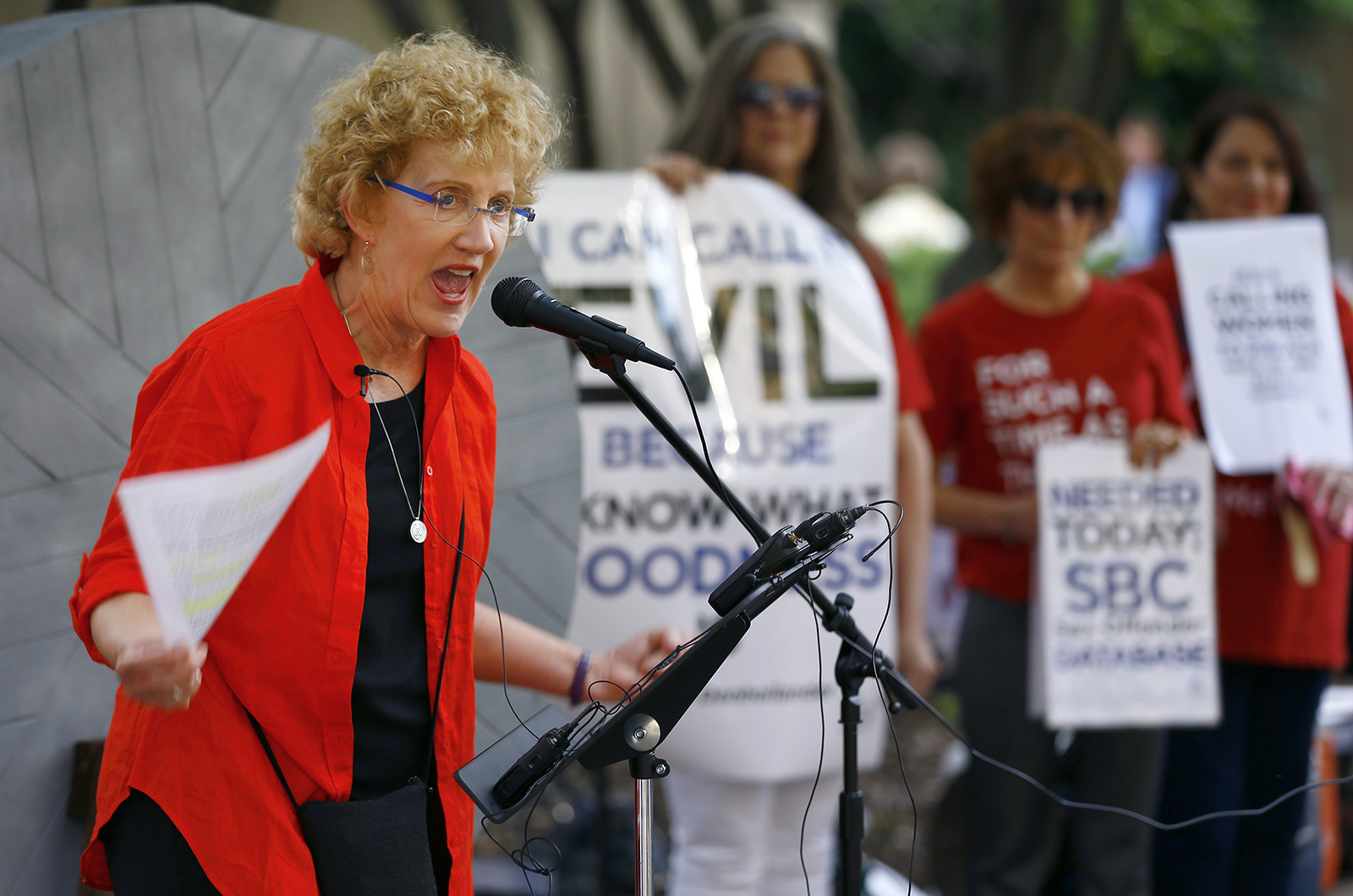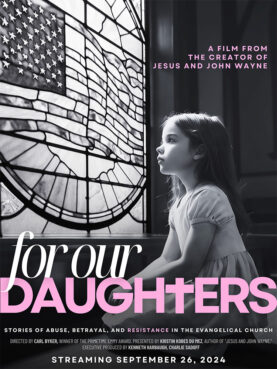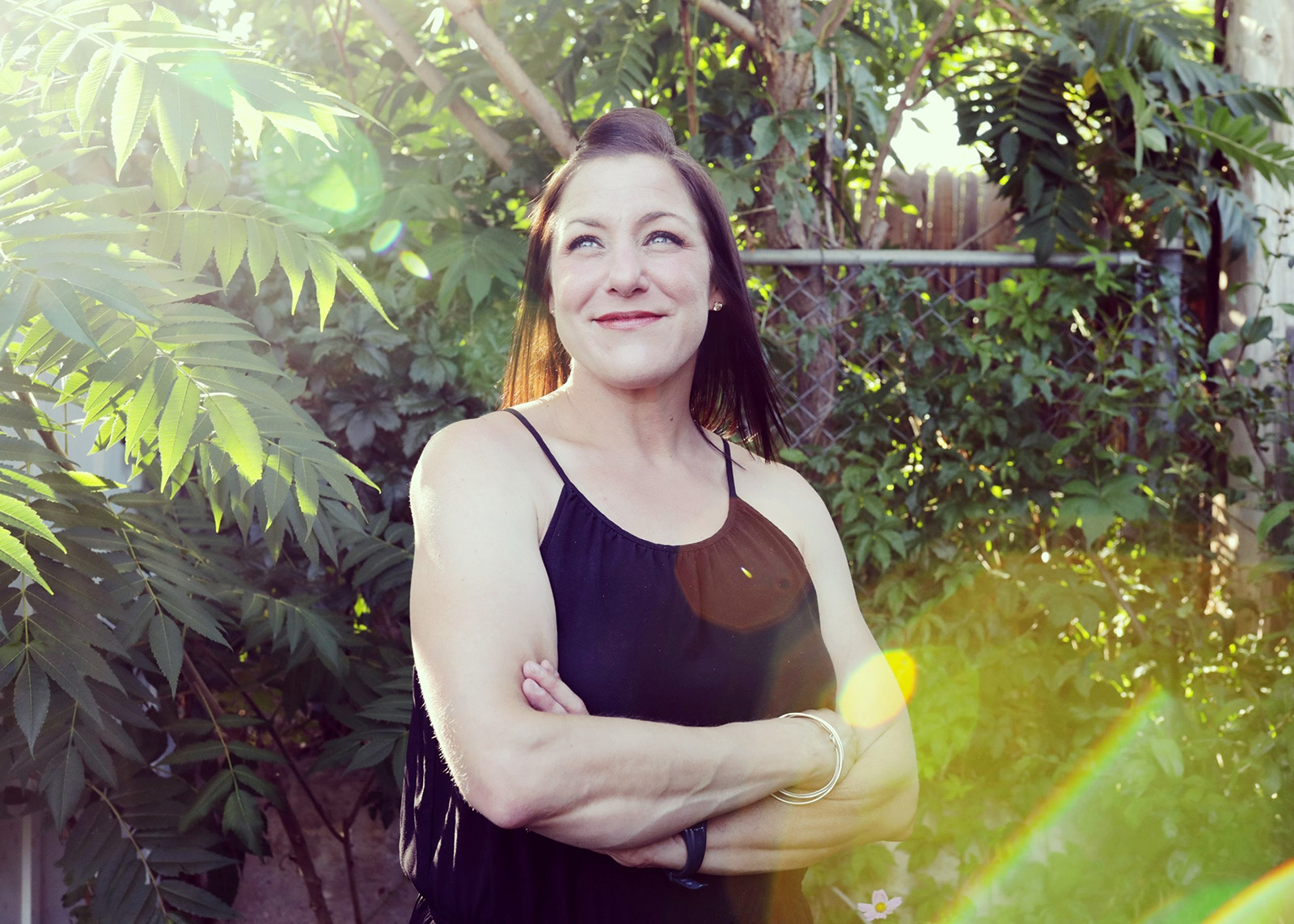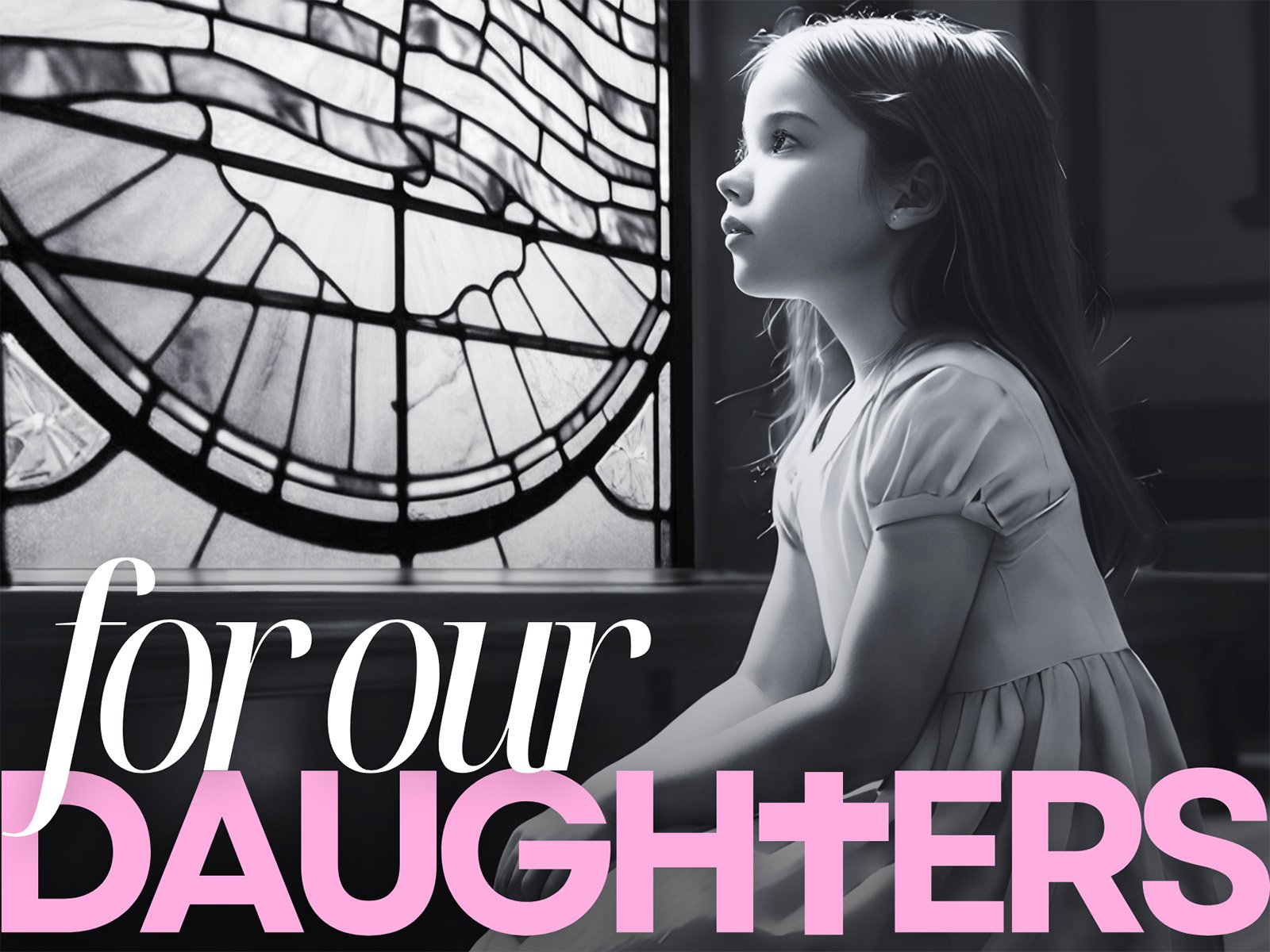
Christa Brown speaks about experiencing abuse, at a rally outside the annual meeting of the Southern Baptist Convention at the Birmingham-Jefferson Convention Complex, June 11, 2019, in Birmingham, Ala. (RNS photo/Butch Dill)
(RNS) — Christa Brown has heard former President Donald Trump and his supporters boast of returning Christians to power in the United States — and returning the nation to what they say are its Christian roots.
She wants none of it.
Brown, a sexual abuse survivor and longtime advocate for abuse reform in the Southern Baptist Convention, has seen what happens when Christian men have power over women in the church. The thought of them having the same power over the country makes her quake.
“I have seen what it means for the largest evangelical Protestant faith group in the country, and it is bloody awful,” Brown says in a new short film about the connections between abuse and Christian nationalism called “For Our Daughters.”
“That is not the country I want,” Brown says.

“For Our Daughters” film poster. (Courtesy image)
Brown is one of several abuse survivors, most with Southern Baptist ties, featured in the film — which also includes clips of Trump promising power to Christian leaders, along with photos of pastors with Trump. Among those pastors is Robert Morris, a former faith adviser to the former president who recently stepped down from his Dallas megachurch after the revelation that he’d sexually abused a 12-year-old girl in the past.
The film also highlights videos of a pair of congregations cheering for abusive pastors, as well as clips of right-wing pastors such as Doug Wilson, who teaches that women were designed to serve men and make babies, and Joel Webbon, a Texas pastor who believes women should no longer have the right to vote.
“Godly women want to feed their men,” Wilson says in one video clip. “Godly women are designed to make the sandwiches.”
The 30-minute film was a labor of love for Kristin Kobes Du Mez, a professor of history at Calvin University, and award-winning filmmaker Carl Byker. The two have been working on a long project about Jesus and John Wayne but worried the voices of abuse survivors might get overshadowed in a longer documentary.
“We needed to let these women speak,” said Du Mez, who featured the stories of survivors like Brown and Woodson in her bestselling book, “Jesus and John Wayne.”
Byker said the film, which will begin streaming on YouTube on Sept. 26, was inspired by the stories of survivors and also by a story from his childhood about how women are mistreated in churches. When he was 12, he recalled, the church his family attended held a vote on a new pastor.
“I asked my mom, ‘When are you going to put your ballot in the box?’” he said in a phone interview. “And she replied, ‘Oh, women aren’t allowed to vote.’ I thought, something is seriously wrong here.”
Du Mez hopes the film will help explain why so many evangelical Christians are willing to support Trump despite his abusive behavior, like that described in the “Access Hollywood” tape in which then-candidate Trump boasted of sexually assaulting women. A clip from the tape is played in the film.

Kristin Du Mez. (Photo © Deborah K. Hoag)
In many churches, she said, power has become more important than morality.
Du Mez said that not all evangelical churches are abusive — but too many of them have allowed abuse to be covered up and have tolerated abusive pastors for too long.
“This is not in any way a blanket condemnation of everybody who attends an evangelical church or of all evangelical leaders,” she said in an interview. “But it is calling out a pattern that happens all too frequently in evangelical churches, and just putting it on display for people to see.”
Brown has seen that pattern firsthand for years. As an advocate for abuse reform, she was ignored by SBC leaders for years. She was also labeled as being part of a “satanic scheme” to bring down the SBC. Brown sees parallels between the way faith has been used to attack abuse survivors and the way it is used in politics to promote causes such as Christian nationalism.
“I believe faith is being exploited to legitimize authoritarianism in the political arena,” Brown said.
The title of “For Our Daughters” came from conversations Du Mez had with evangelical women after publishing “Jesus and John Wayne,” which describes the toxic masculinity found in some evangelical settings. Those women, she said, thanked her for the book, saying that they hoped things would be better for their daughters because of it.

Jules Woodson. (Photo by Rachel Ellis)
One of the most powerful moments in the film occurs when a photo of young women, including then-teenager Jules Woodson, is shown with Andy Savage, a former youth pastor who later admitted to what he called “sexual misconduct” involving Woodson. That’s followed by Woodson telling her story about abuse at the hands of Savage, and then how it was covered up and she was blamed.
Years later, Savage admitted having a “sexual incident with a female high school student” during a service at the Memphis, Tennessee, megachurch where he served as pastor. The congregation responded with a standing ovation.
“I mourn for that girl,” Woodson said during an interview. “What happened changed the trajectory of my life, and I wonder what it would have been like, had everything not happened.”
Woodson rejected the idea that Christian men need to be in charge of America.
“God doesn’t need these people,” she says in the film. “I mean, let’s talk about narcissism. For these men to think that they are so important to the mission, to God, to the nation. Give me a break.”
The film also features Tiffany Thigpen, who was assaulted by a pastor named Darrell Gilyard as a teenager and later testified against him when he was accused of abusing girls at another church. She recounts how for years her pastor had told her to be silent and told her that any controversy about Gilyard — who was a protégé of Moral Majority founder Jerry Falwell Sr. as well as SBC leaders such as Jerry Vines and Paige Patterson — would blow over. Gilyard was eventually convicted in 2009 and sentenced to three years in prison. A few months later, he was back in the pulpit.
Thigpen worries that some Trump supporters will reject the film and the concerns of survivors by labeling them a part of a liberal agenda to oppose the former president. She said she has bigger concerns, mainly that too many of her fellow Christians act in ways that are contrary to the teaching of Jesus.
“They’re doing everything against what’s supposed to be right and good and true,” she said. “The fact that they have platformed Donald Trump as a savior and as the answer that God’s provided for us. It just shows how far we have lost our minds.”
Attorney and abuse advocate Rachael Denhollander, whose testimony helped convict former USA Gymnastics doctor Larry Nassar, says churches that teach that women must submit to the authority of men, and that God gave men absolute power over women, can create an abusive culture.
“And so men think they can get away with abuse because they actually can get away with it,” she says in the film.
Denhollander said in an interview that many Christians rallied to her side when she testified against Nassar. But she thinks that had her abuser been a pastor or someone like Trump, things would have been very different.
“Here’s the reality,” she said. “Had I been victimized by Donald Trump instead of Larry Nassar, my community would not only not be supporting me — they would be actively vilifying me. They would be actively supporting and voting for an abuser.”

